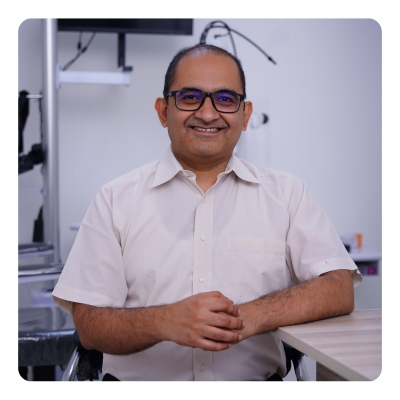Restoring Vision through Advanced Retina Surgery
The retina, a vital layer at the back of the eye that senses light, is crucial for clear vision. Retina surgery treats conditions like retinal detachment, macular degeneration, diabetic retinopathy, epiretinal membrane, vitreous haemorrhage, and macular holes. This specialised procedure uses advanced microsurgical techniques and is performed by ophthalmologists trained specifically in retina surgery to preserve and restore vision effectively.
- High Success Rates
- Specialised Expertise
- Painless
Restoring Vision through Advanced Retina Surgery
The retina, a vital layer at the back of the eye that senses light, is crucial for clear vision. Retina surgery treats conditions like retinal detachment, macular degeneration, diabetic retinopathy, epiretinal membrane, vitreous haemorrhage, and macular holes. This specialised procedure uses advanced microsurgical techniques and is performed by ophthalmologists trained specifically in retina surgery to preserve and restore vision effectively.
- Painless
- High Success Rates
- Specialised Expertise
Diabetic Retinopathy
Surgical interventions for diabetic retinopathy may involve vitrectomy, a procedure to remove scar tissue and blood from the eye's vitreous gel. This helps to improve oxygen and nutrient supply to the retina, preserving vision and preventing further damage.
Macular Edema
Surgical options for macular edema include vitrectomy, where the surgeon removes the vitreous gel to access and treat the swollen macula directly. This procedure aims to reduce fluid buildup and improve vision, often combined with laser therapy or injections for optimal outcomes.
Retinal Detachment
Surgery for retinal detachment typically involves techniques like scleral buckling, where a silicone band is placed around the eye to push the wall of the eye against the detached retina, helping it to reattach. Alternatively, vitrectomy may be performed to remove the vitreous gel and any scar tissue, allowing the retina to be reattached more effectively.
Central Serous Retinopathy
In severe cases of central serous retinopathy, surgical interventions such as laser photocoagulation or photodynamic therapy may be used. These procedures aim to seal leaking blood vessels or reduce fluid accumulation under the retina, restoring clearer central vision and preventing recurrence.

Dr. Hari Narayan Prasad
MBBS, MS, DNB (Ophthalmology), FVRS Vitreo-retinal Surgeon
- Fourth floor, Commercial Complex PNR Highnest, 1-2-22/PNRHN/3/B, Hyder Nagar, Dharma Reddy Colony Phase II, Kukatpally Housing Board Colony, Kukatpally, Hyderabad,